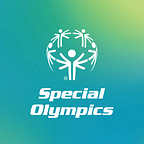The Athlete’s Oath in Nduta Refugee Camp
The legacy of Eunice Kennedy Shriver reaches some of the world’s most vulnerable people, 50 years on from the birth of Special Olympics.
Let me win, but if I cannot win, let me be brave in the attempt.
The same Special Olympics athlete’s oath, first introduced by Eunice Kennedy Shriver at the inaugural Special Olympics games in Chicago in 1968, is carefully written out in both English and Kiswahili, and held up as a parade of athletes makes their way across a red dust field in Nduta refugee camp for the first time.
In December 2018, Special Olympics held a coaches training in the Nduta refugee camp, in the Kigoma region of northern Tanzania, near the border with Burundi. Fifty one parents, teachers, social workers and community members stood up to serve as coaches for children and adults with, and without, intellectual disabilities.
Nduta refugee camp is home to over 120,000 displaced people, mainly from Burundi with a minority from the Democratic Republic of the Congo. According to Oxfam, Burundi is one of the world’s poorest countries and over a decade of civil war has left the country in a continuing state of instability. Since 2003, widespread violence and political protest forced tens of thousands vulnerable people to leave their hoes and flee into neighboring countries, particularly Tanzania and Rwanda.
In 2015, Nduta refugee camp was opened in an effort to relieve overcrowding in Nyarugusu refugee camp, the third largest refugee camp in the world. Tens of thousands of Burundians have moved from Nyarugusu to Nduta, and then some again to Mtendeli, according to the UN Refugee Agency (UNHCR).
Like Nyarugusu and Mtendeli, the conditions of Nduta are characterized by abject poverty and a lack of basic necessities. However, small scale farms abound and open land has been used to create sports grounds for football, volleyball and basketball, using improvised balls made from plastic bags. Education is provided by humanitarian agencies such as the International Rescue Council.
The coaches training was well-received, and taken very seriously by the camp community, from participants to the camp administration and International Rescue Council officials. The 51 participants received the Special Olympics general orientation coach training, and mounted a practical mini-competition in athletics as a way of demonstrating the skills they had learned.
Nduta has a special needs school, and about 22 students were watched by a crowd of almost 1,000 family members, people from the local refugee community and UNHCR staff. The coaches had organized candy as part of the prizes, which caused a lot of excitement amongst the athletes and family members!
Nduta’s Camp Commander Mr. Barnabas Kipi, said the mini competition held from the training was the most exciting and valuable event he had yet seen take place in the camp. He reaffirmed his promise to provide support to the coaches when they organize future competitions, adding that he would personally award a goat for a feast to the team with best performance. He thanked Special Olympics Tanzania for their good service to the camp community.
Similar training and competitions are being offered in the Nyarugusu and Mtendeli camps, read more here below:
